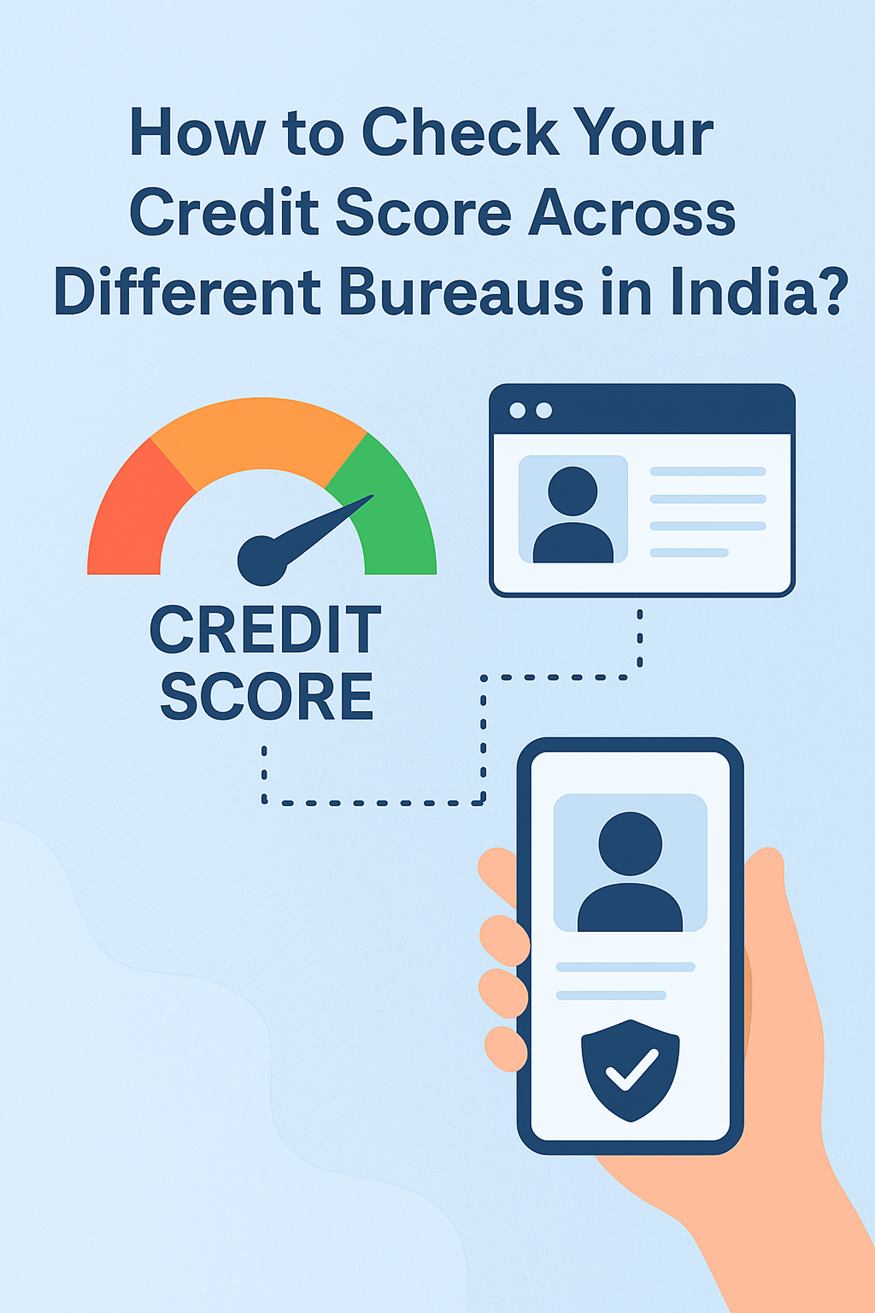Why Do Credit Scores Vary Across Credit Bureaus?

- Why Does Credit Score Vary in Credit Bureaus?
- Different Credit Scoring Models Used by Bureaus
- How to Check Your Credit Score Across Different Bureaus in India?
- Best Practices to Maintain a Healthy Credit Score Across All Bureaus
- Credit Scores Can Vary, But It’s Possible to Manage Them
- Frequently Asked Questions
From personal loans to home loans, your credit score affects your eligibility for any loan you apply for. A good score boosts your chances, while a bad one does the opposite.
However, it's often seen that credit bureaus report different scores for the same person. In fact, the deviation gets major in case of errors. This inconsistency not only creates confusion but also makes it difficult to determine which score truly reflects a person's credit health.
So in today's blog, let's find out why credit score varies among credit bureaus and how you can maintain a healthy score, everywhere.
Why Does Credit Score Vary in Credit Bureaus?
Various reasons lead to different credit scores among bureaus. Here are the most common ones:
Different Scoring Models and Algorithms
Every credit bureau uses a different credit scoring model based on unique algorithms. So even if your data is consistent, the credit score will be different on each platform.
Know your CIBIL score for free—calculate it here!
Inconsistent Data Reporting
More often than not, lenders only report your credit data to the bureau they are associated with. This inconsistency in reporting creates a gap and leads to missing data, causing differences in the credit score.
Frequency of Updates
There's no fixed schedule for credit data updates. Bureaus do so whenever lenders send their reports. So, if one bureau has more recent data, its score may differ from others, even though it still shows older information.
Errors and Disputes
Many times, lenders mistakenly provide inaccurate credit data to a bureau. For example, they may mark a loan active even if you've closed it already. This is one of the most common reasons that leads to variation in credit scores across bureaus.
Differences in Credit History
Some credit bureaus tend to have records going back further than others. The reason? Lenders don't report your credit data to every bureau. This strongly influences your credit score and is often a reason for inconsistency.
Variation in Factor Weightage
Various factors affect your credit score, such as payment history, credit utilisation, etc. Every bureau prioritises these factors differently, leading to small but noticeable differences in scores.
Different Credit Scoring Models Used by Bureaus
TransUnion CIBIL, Experian, Equifax, and CRIF High Mark—these are the four credit bureaus in India. Each uses its own proprietary scoring algorithms to calculate credit scores. These algorithms determine how your credit behaviour is analysed and weighted:
- TransUnion CIBIL: The most popular in India, CIBIL uses the CIBIL Score 2.0 model. It ranges between 300 and 900 and gives higher weightage to repayment history, credit utilisation, credit mix, and recent credit activity.
- Experian: Experian Credit Score also ranges between 300 and 900 and focuses heavily on repayment history, credit utilisation, credit history, etc.
- Equifax: The Equifax Risk Score model ranges between 300 and 850. It mainly evaluates factors like repayment consistency, credit mix, and credit utilisation rate.
- CRIF High Mark: Also uses a 300-900 scale and analyses credit behaviour, outstanding balances, and payment trends.
Since each bureau uses different scoring algorithms, credit bureaus often generate slightly different scores even when they're working with the same financial data.
How to Check Your Credit Score Across Different Bureaus in India?

30% of Indians have faced loan or credit card rejections due to poor or absent credit scores. But here's the catch—just by regular monitoring, you can avoid this risk and improve your loan approval chances.
Don't know how to do that? Follow these steps to get a credit report in India for free:
- Go to the official site of any of the credit bureaus in India: CIBIL, Experian, Equifax, or CRIF High Mark.
- Sign up for an account by entering your details like your name, email, mobile number, and PAN card info.
- You'll receive an OTP from the bureau. Enter the same to verify your identity and log in.
- Now, find and submit the request for your "Free Credit Report" and download it.
Note: As per the new RBI rule, borrowers are entitled to one free full credit report every year.
Get instant personal loans of up to ₹5 lakhs without any hassle—try our Instant Loan App now!
Best Practices to Maintain a Healthy Credit Score Across All Bureaus
Differences are inevitable. So, your aim should be to maintain your credit score across all bureaus. Here are a few tips for the same:
1. Pay Your Dues on Time
Your repayment history affects your credit score by a whopping 35%! So, always pay all your EMIs and credit card bills on time to maintain a good score.
2. Keep Your Credit Utilisation Low
One of the easiest ways you can improve your credit score in India is by keeping your credit utilisation low. Put simply, never exhaust more than 30% of your total available credit.
3. Avoid Multiple Frequent Loan Applications
Each time you apply for a loan, whether a personal loan, a car loan, or a home loan, lenders check your credit score. It triggers a hard inquiry, which reduces your score by a few points. So, always refrain from applying for multiple loans at once.
4. Diversify Your Credit Mix
A credit portfolio with a healthy balance of secured and unsecured loans shows lenders that you're reliable and can handle repayments responsibly. It also improves your credit score.
5. Regularly Monitor Your Credit Report
Last but not least, always keep an eye on your credit report. This will help you identify and eliminate errors, reducing your score immediately.
Curious to see if you're eligible for a personal loan? Try our Personal Loan Eligibility Calculator now!
Credit Scores Can Vary, But It's Possible to Manage Them
Your credit score matters a lot. Scores can be different because of bureau scoring systems or update times. However, checking your reports regularly, fixing errors, and keeping a mix of credit can help your score reflect your true creditworthiness.
Want to put your good credit score to use? Apply for a personal loan with Hero FinCorp today and get quick, hassle-free approval!
Frequently Asked Questions
1. Why do credit scores differ between bureaus in India?
Credit scores often differ between bureaus because each of them uses its own scoring model and data sources.
2. Which credit bureau is most trusted by Indian lenders?
TransUnion CIBIL is the most trusted and popular credit bureau in India.
3. How often should I check my credit report?
You should check your credit report at least once a year. But checking it quarterly or monthly can significantly reduce the scope of errors.
4. What should I do if I find an error in my credit report?
If you find an error in your credit report, immediately raise a dispute with the credit bureau by filing a report online or by mail.
5. Does checking my credit score reduce my score?
No, checking your credit score doesn't reduce your score.
Disclaimer: The information provided in this is for informational purposes only. While we strive to present accurate and updated content, travel conditions, weather, places to visit, itineraries, budgets, and transportation options can change. Readers are encouraged to verify details from reliable sources before making travel decisions. We do not take responsibility for any inconvenience, loss, injury, or damage that may arise from using the information shared in this blog. Travel involves inherent risks, and readers should exercise their judgment and caution when implementing recommendations.